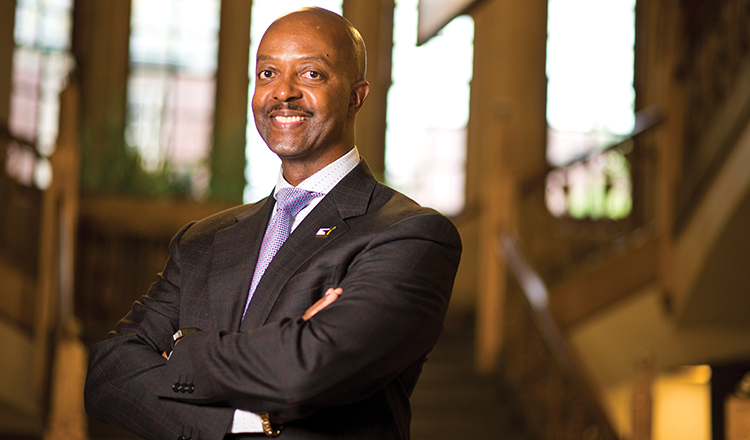Anthony “Tony” Harris (ME’75, HDR E’13) has always loved math. But he didn’t take calculus or any advanced classes in related fields — they weren’t even available at his south-side-Chicago high school in the 1960s. That never stopped Harris from dreaming big. He thought he’d become an architect, but his drafting-class teacher advised him engineering could be more lucrative — especially for a bright, math-loving student like himself.
“I was a pretty cocky kid,” says Harris, now president and CEO of Campbell/Harris Security Equipment Company. “I didn’t think anyone could outperform me in math, no matter what prerequisites they’d taken. Looking back, sometimes it’s good when you don’t know how steep the mountain is that you’re about to climb.”
“Sometimes it’s good when you don’t know how steep the mountain is that you’re about to climb”
Harris would come to be passionate about helping others climb that mountain. At Purdue, he became one of the founders of the National Society of Black Engineers (NSBE), now the largest student-run organization in the country with 27,000 members and chapters on five continents. “It all started with a little brotherhood of six guys,” Harris says. “There’s no way we could have imagined what NSBE would become.”
That brotherhood was the so-called Chicago Six: Harris and high-school classmates George Smith (ECE’76), Stanley Kirtley (CE’75), Brian Harris (EnE’75), and John Logan (EnE’75), plus Edward Coleman (ME’75), who attended a different Chicago high school.
But the Chicago Six had more in common than their hometown: they were black engineering students, a rarity on Purdue’s campus in 1971. So the Six leaned on one another, along with Purdue professors like fellow Chicagoan Arthur Bond (ECE’68, MS ECE’69, PhD ECE’74, HDR E’09), for support.
“Having the Six completely changed my experience, but we wanted to help more than just our group,” Harris says. “There was really no support network in place for minority students, and most of us had very poor academic preparation relative to our peers.”
So began the seeds of an idea that would become NSBE, with Bond’s advisory support — an idea that came into sharper focus after Harris became the Purdue chapter president of the American Society of Mechanical Engineers. “I traveled to other campuses and saw the infrastructure that ASME had, and we started wondering, ‘What if our little society had this kind of underpinning?’”
The society borrowed some ideas from ASME: inviting engineers to come speak at Purdue, putting together a résumé book, and helping other black students to feel supported and welcome in the engineering major. “We planted a seed, but we get way too much credit,” Harris says. “All the students since have run with it and made it what it is.”
What NSBE is today is quite different from the 1970s model, explains Harris, who serves as a member of the organization’s Executive Leadership Council. “The challenges for black students have changed; it’s not about schools not being willing to accept us, it’s about preparation,” he says. “Now we’re focusing on getting kids interested as early as third or fourth grade. We need to teach them early that math is fun, relevant, and a great opportunity for them.”

